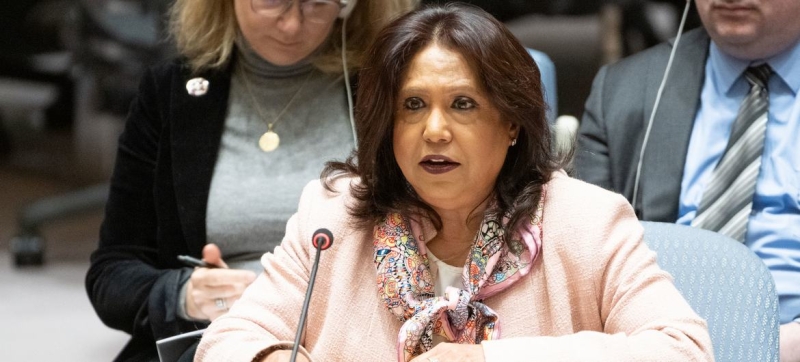
Pramila Patten, UN Special Representative on Sexual Violence in Conflict. INTERVIEW | Sexual violence in conflict: a crisis within a crisis Human rights
Ukraine is a rare country at war that does not seek to hush up the problem of sexual violence. On the contrary, in the very first days after Russia’s full-scale aggression, the Prime Minister of Ukraine and the head of the Foreign Ministry of this country told the public about the first incidents related to sexual violence.
The UN Secretary General’s Special Representative for Combating Sexual Violence in Conflict, Pramila Patten, spoke about this in an interview with the UN News Service. The interview is dedicated to the International Day, which is celebrated on June 19.
The fight against stigma and the example of Ukraine
“For me, for example, Ukraine is an example: instead of hiding away the topic of sexual violence, which occurred there in the very first days after the start of Russian aggression, the Prime Minister and the Minister of Foreign Affairs came out and loudly announced the first such cases,” – noted Patten.
25 years of silence
Transparency and the fight against stigma are key prerequisites for ending sexual violence in conflict. Patten spoke about a victim from Bosnia and Herzegovina with whom she had the opportunity to communicate. A woman remained silent for 25 years about being sexually assaulted during the bloody war in the Balkans. “If she had spoken then, according to her, she would have lost her husband and children, they would have simply turned their backs on her,” the Special Representative added.
Unreliable statistics
As for the statistics of such crimes, the real figures are much higher than the official figures precisely because it is not customary to talk about sexual violence. Unlike Ukraine, this unspoken rule is still in effect in many countries of the world.
We are talking about a crime that is rightly called ” the largest hushed up atrocity in history”
“We are talking about a crime that has rightly been called ‘the largest suppressed atrocity in history’, a crime that is rarely condemned. It is also a crime that often goes unreported, largely due to stigma. “We see survivors going through the double tragedy of first being raped, then being abandoned by their loved ones,” Patten said. “This is the only crime for which society tends to blame the victim rather than the perpetrator.”
Stigma is not the only reason why victims refuse to seek help: people are also afraid of revenge. Especially when the rapist lives nearby, she explained. Additionally, in some cases, victims simply do not trust law enforcement.
The figures reported by the UN reflect those reports that the UN has been able to verify, which is often just the tip of the iceberg. For example, the Secretary-General’s report spoke of a thousand cases of sexual violence in 2022 in the Democratic Republic of the Congo, while at a meeting of the Security Council, UNICEF reported 32 thousand cases, and the UN Population Fund – 38 thousand incidents. With such a scatter, it is difficult to talk about reliable information. The main thing, Pramila Patten believes, is that the ice has finally broken and the international community in the 21st century has finally decided to talk about the problem of sexual violence in conflict. 60~p>This happened in 2009, when the Security Council established the mandate of the Special Representative on this issue and “looked at the problem through the eyes of girls and women, whose bodies have been part of wars throughout human history.” The resolution’s authors then called the mandate “the voice of the voiceless.” Later, the Security Council returned to this topic many times in order to provide the Special Representative with the necessary powers for effective work. It was only in 2013 that Council members first mentioned boys and men who are also subject to sexual violence during war in their resolution. “So we have a full-fledged legal framework, there is no need for new resolutions,” says Patten. “The main thing now is to implement the existing ones.”
Rehabilitation for victims
One of the main issues raised by the international community in the context of the problem of sexual violence in conflict is the rehabilitation of victims. The complex of such measures includes medical, psychological and legal assistance. “Thanks to the existence of this mandate, we are now able to support thousands of people,” says Patten. “Over the past 15 years, I have seen big changes. I have seen more and more victims willing to seek help.” 25 UN agencies are participating in the UN’s efforts in this area.
Joint efforts
For example, in Ukraine, six UN agencies are jointly implementing projects to support victims of sexual violence. This is necessary because such crimes have many aspects – gender violence, children’s rights, justice, health care and many others.
Since the beginning of the war in Ukraine, as the Special Representative reported, her team has been closely engaged in the problem of human trafficking for the purpose of sexual exploitation. “With such a large-scale forced displacement in a short period of time, I see that within the humanitarian crisis there is another invisible crisis,” she explained. Let us recall that immediately after the start of the full-scale invasion of Russia, millions of Ukrainians were forced to flee to neighboring countries.
New partners
This concerns not only Ukraine, Patten noted. Moreover, there is a need to involve additional partners in these efforts. “For example, UNESCO,” she says. “I think it is extremely important to take care of girls’ education, and I intend to approach UNESCO with this issue.”
